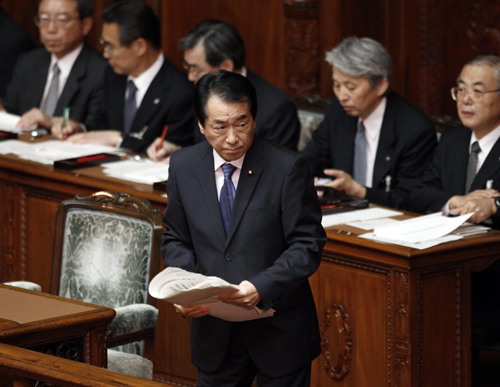Asia-Pacific
Japan PM warns of Greece-like debt crisis
(Agencies)
Updated: 2010-06-11 14:31
 |
Large Medium Small |
TOKYO - Japan's new prime minister warned Friday that his country could face a financial mess like that of Greece if it did not deal urgently with its swelling national debt.
 Japan's new Prime Minister Naoto Kan returns to his seat after delivering his keynote speech at the lower house of parliament in Tokyo June 11, 2010. Kan said on Friday that overcoming deflation is an urgent issue and the government will work with the Bank of Japan to end price falls. [Agencies] |
Naoto Kan, speaking in his first address to Parliament after taking office Tuesday, said Japan, the world's second-largest economy, cannot continue to let government debt swell while state finances are under pressure from an aging and declining population.
"It is difficult to sustain a policy that relies too heavily on issuing debt. As we have seen with the financial confusion in the European community stemming from Greece, our finances could collapse if trust in national bonds is lost and growing national debt is left alone," he said.
| ||||
Kan, who became Japan's sixth prime minister in four years after a short stint as finance minister, promised his government would work closely with the Bank of Japan to avoid an increase in deflation and would focus on developing a "strong and comprehensive" policy.
Kan has said he will also consider raising taxes, an issue he said previous governments had been too timid to face. A social progressive and a fiscal hawk, Kan said he would announce further details of his economic growth plan later this month.
But he said he aims to have the economy grow by more than 2 percent annually by fiscal 2020.
After amassing a vast public debt and overspending to the tune of 13.6 percent of gross domestic product in 2009, Greece was saved from defaulting on its loans by the first installment of a euro110 billion ($131 billion) rescue package from the International Monetary Fund and the 15 other nations that share the euro currency.
Kan's predecessor, the unpopular Yukio Hatoyama, abruptly quit last week after he failed to keep a campaign promise to move the sprawling Marine Corps Air Station Futenma off the southern island of Okinawa. His ratings had fallen below 20 percent on what was perceived as the weak leadership.
The successor is enjoying a jolt of public support, with major newspaper polls giving Kan approval ratings of between 60 and 70 percent - good news for his party heading into next month's elections.
His Democratic Party is considering a July 11 date for the polls, but that has caused a row with their coalition partner and prompted its leader to announce in the early hours Friday his resignation from a Cabinet post. The junior coalition party wants instead to extend the current parliamentary session to vote on a key postal reform bill.
Kan, a grass-roots populist known for standing up to bureaucrats, is drawing support from undecided voters, and "favorable winds" are blowing for the Democratic Party, said The Nikkei, Japan's top business newspaper.
The approval rating for Kan's Cabinet, installed Tuesday, came to 68 percent, according to the Nikkei's survey.



